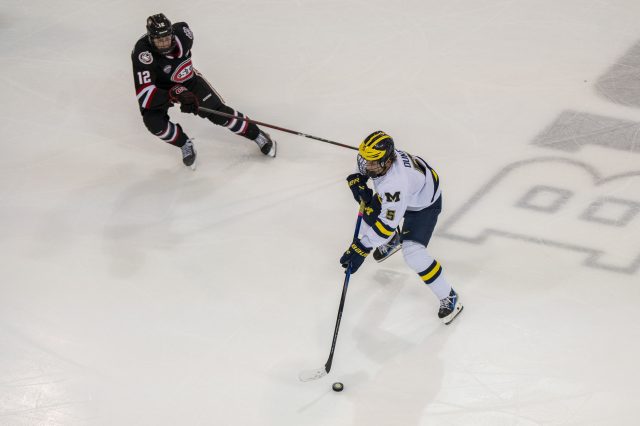[ad_1]
The power play is usually the time for a hockey team to make its move in a game, especially for Michigan in recent years. In coach Brandon Naurato’s three years at the helm, the Wolverines have finished with the 3rd, 12th and 1st-ranked power plays in the country.
But that hasn’t been the case so far this season for No. 10 Michigan, which has struggled on the power play. The Wolverines’ penalty kill, though, has come along much more quickly and is already seeming to gel as a unit. With an impotent power play and shutdown penalty kill, the special teams play of Michigan’s early season games have often been uneventful — and Friday’s 3-0 victory over St. Cloud State was no different.
While the Wolverines’ penalty kill shut out the Huskies on four power plays, Michigan went 0-for-4 with a man advantage itself, instead finding a special teams goal on a shorthanded breakaway.
“The power play’s not good enough,” Naurato said. “Not for my expectations, not even close … And we’re getting the looks, just it’s an inch off, just misses, whatever. But we’ve gotta be better.”
Michigan’s first power-play opportunity in the first period set the tone for a night full of near misses and failed chances. First, senior defenseman Ethan Edwards missed a slapshot from the middle of the offensive zone. Seconds later, sophomore forward Evan Werner followed it up with a shot of his own that, even after a shot off a deflection, still wouldn’t find the back of the net.
A second five-man unit came in for Michigan, but was equally unproductive. Throughout the game Friday, the Wolverines were usually organized on the power play, they controlled the puck well and they certainly weren’t short of good looks. They just couldn’t turn their chances into goals. That was the story of not just the first, but all four power plays for Michigan.
Although St. Cloud State’s power play, too, was unable to produce a goal, it generated many fewer chances against the Wolverines’ penalty kill. The Huskies often looked disorganized and indecisive, failing to get as many quality shots as they would have liked.
“I think the biggest thing for us is pressuring them,” Duke said. “Getting the clears when we can. It was good to see that we executed on that tonight.”
That pressure manifested itself in Michigan pursuing several shorthanded opportunities, one of which turned into sophomore forward Garrett Schifsky’s goal. After winning over the puck from St. Cloud State, junior defenseman Tyler Duke cleared it ahead, seemingly with no target in mind. Schifsky had other ideas, though, taking the puck in stride and capitalizing on a breakaway.
It also resulted in some awkward moments for the Huskies. During a second period power play, with the Wolverines clearing time and time again, St. Cloud State was scrambling to find a goal. With just seconds remaining on the penalty, it looked like the Huskies had an advantage as the puck went through the neutral zone to the left side.
When the puck got there, though, the St. Cloud State player froze, and instead of carrying the puck toward the goal, he passed it backward — and as the opportunity to score ended, so did the timer for the man advantage.
Michigan’s penalty kill excelled in all aspects Friday, but to the Wolverines it all comes back to one word.
“The pressure,” Naurato said on what impressed him from the penalty kill. “… Doing it together and sharing clears and getting blocks, pressuring pucks, all the cliche stuff that coaches talk about on a good PK, but they’re really doing a good job.”
Michigan’s special teams are at almost opposite ends of the spectrum right now. After Schifsky’s goal Friday, the Wolverines have scored more shorthanded goals than power-play goals this season.
There’s no doubt that Michigan has plenty of room to improve on the power play this season. But on Friday — with the help of their penalty kill — the Wolverines got away with it.
Related articles
[ad_2]
Source link











